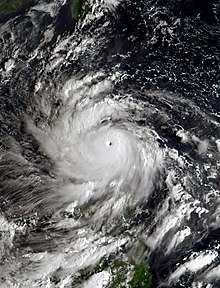 Noru at peak intensity east of the Philippines on the early morning of September 25 | |
| Meteorological history | |
|---|---|
| Formed | September 21, 2022 |
| Dissipated | October 1, 2022 |
| Very strong typhoon | |
| 10-minute sustained (JMA) | |
| Highest winds | 175 km/h (110 mph) |
| Lowest pressure | 940 hPa (mbar); 27.76 inHg |
| Category 5-equivalent super typhoon | |
| 1-minute sustained (SSHWS/JTWC) | |
| Highest winds | 270 km/h (165 mph) |
| Lowest pressure | 914 hPa (mbar); 26.99 inHg |
| Overall effects | |
| Fatalities | 40 total |
| Missing | 5 |
| Damage | $313 million (2022 USD) |
| Areas affected | |
| IBTrACS | |
Part of the 2022 Pacific typhoon season | |
Typhoon Noru, known in the Philippines as Super Typhoon Karding, was an intense and destructive tropical cyclone that affected Vietnam, Thailand, and the Philippines — where it caused widespread agricultural damage. Noru, which means Roe deer in Korean, the sixteenth named storm and eighth typhoon, and third super typhoon of the 2022 Pacific typhoon season, Noru originated from a disturbance over the Philippine Sea, slowly tracking eastward until its development into a tropical depression, where it began to move westward.
Noru underwent rapid intensification as it approached Luzon, with 10-minute maximum sustained winds intensifying by 85 km/h (50 mph) in the span of 24 hours. Right before its first landfall, Noru reached its peak intensity with maximum sustained winds of up to 175 km/h (110 mph) and as a PAGASA super typhoon. Noru made its first landfall over the Polillo Islands on September 25 at 15:30 PHT (09:30 UTC) as a Category 4. It then made its second over Dingalan, Aurora five hours later as a high-end typhoon. It significantly weakened while crossing Luzon and emerged into the South China Sea nine hours later. Noru continued to re-intensify over the South China Sea, reaching winds of up to 155 km/h (100 mph) before making its third and final landfall in Da Nang, Vietnam. Tracking further westward, Noru brought heavy winds and rains to Thailand as a tropical depression and later dissipated on October 1.
Typhoon Noru, which struck the Philippines in 2022, was the strongest typhoon to hit the country in the Pacific typhoon season of that year.[1] The National Disaster Risk Reduction and Management Council (NDRRMC) of the Philippines reported at least ₱304 million (US$6.18 million) in infrastructural damages and ₱3.08 billion (US$62.5 million) in agricultural damages, totalling to ₱3.38 billion (US$68.7 million). 40 people have been reported dead following the typhoon, another 5 remain missing.
- ^ "UNICEF concerned for children in the Philippines as Super Typhoon Noru/Karding strikes". www.unicef.org. Retrieved January 11, 2023.